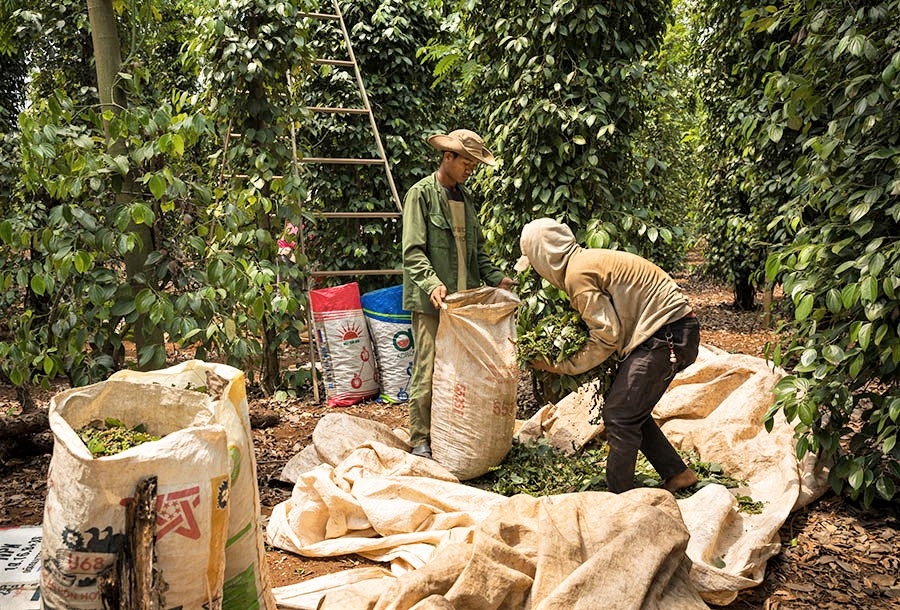
The STDF project aimed to enhance compliance with international food safety standards and restore buyer confidence in peppercorn from Viet Nam, Cambodia, and Laos PDR, while increasing financial returns, productivity and market access for smallholder farmers through the adoption of a harmonized Code of Practice and participatory guarantee system.
Peppercorn is one of the most widely used spices in kitchens around the world, however, making sure its journey from production to table meets international food safety standards is not always straightforward. Due to limited resources and knowledge, smallholder farmers, who play a crucial role in its production in Southeast Asia, frequently face challenges in meeting food safety regulations.
STDF supported this project to tackle critical SPS challenges in Southeast Asia’s peppercorn supply chain, where poor agricultural and handling practices led to food safety risks including excessive pesticide residues, pathogen contamination (including salmonella), adulteration, and exposure to unsanitary conditions.
To address these risks, STDF worked with partners to improve food safety, quality, and traceability from production through processing. The project developed and implemented a Code of Practice based on Codex standards, specifically targeting food safety and phytosanitary issues in peppercorn production. A grassroots ppp was also integrated to encourage community responsibility, peer learning, and widespread adoption of good practices.
Read project story here.
The project delivered strong results, enhancing SPS capacity, building confidence in the region’s peppercorn, unlocking new market access, strengthening rural economies, and raising farmer incomes
Its success also catalysed broader application across spice and horticulture value chains in the region. In Cambodia, CAPSAFE, an EU/GIZ project, started exploring opportunities to scale up the STDF-developed CoP, strengthening sustainable farming practices and expanding market opportunities for more smallholder farmers.
This STDF project has shown that its approach can enhance agricultural productivity and market access across ASEAN countries, offering a scalable solution to improve market access and facilitate safe trade in the region and beyond.
Key results achieved include:
- 30 tons of black pepper exported to China by Cambodia’s Sela Pepper Company, marking first-ever shipment in 2024
- 10% increase in yields and 30% rise in income for Cambodian farmers
- 10 safe peppercorn production models in Viet Nam, with 100% of samples meeting European standards.
- Good pesticide management practices in Viet Nam helped reduce pesticide use from 10 bottles per season to 2, resulting in a 30% cost reduction
- Etu Green (Lao PDR) secured new markets for peppercorn and other products at Vipo 2024 in Hanoi
Continue developing localized resources to drive adoption
The project’s use of local-language Interpretation Guides alongside the Code of Practice proved highly effective. Future initiatives should build on this approach to ensure wider understanding and uptake among smallholder farmers.
Sustain collaborative models to strengthen accountability
The G-PPP model successfully brought together farmers, buyers, and industry actors. Maintaining and replicating this inclusive approach can reinforce shared ownership and long-term benefits.
Build on strong public-private partnerships to accelerate impact
Effective collaboration between governments, industry, and farmers was key to the project's success. Future efforts should deepen these partnerships to scale and sustain good agricultural practices (GAP).
Reinforce local ownership for sustainability
By actively engaging farmer groups and local authorities, the project created a strong foundation for continuity. Continued local leadership and institutional support are essential for lasting impact.
Retain adaptability in project design and delivery
The project adapted well to disruptions such as COVID-19. Embedding flexibility in planning and communication strategies remains critical to navigating future uncertainties.
Embed gender and environmental sustainability in future interventions
The project addressed cross-cutting priorities, including gender equality and eco-friendly farming. Sustaining and expanding these efforts will strengthen inclusivity and resilience.
Continue fostering South-South knowledge exchange
The collaboration between Viet Nam, Cambodia, and Lao PDR enhanced regional problem-solving. Ongoing peer learning and cooperation will help embed and expand best practices.
Leverage project success for regional scale-up
Building on momentum from the project, initiatives like Cambodia’s EU/GIZ-funded CAPSAFE project are scaling up the Code of Practice. Similar investments can help expand sustainable farming and market access across the region.